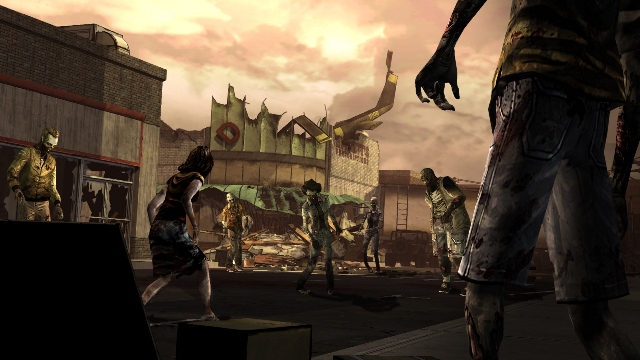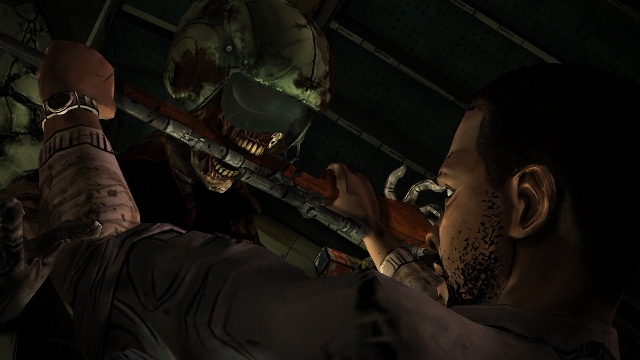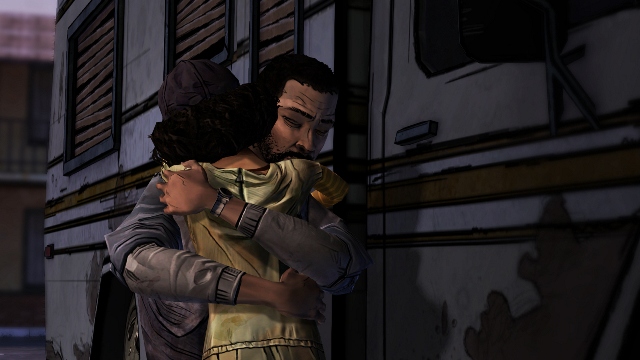Interview: The Walking Dead Designer Harrison Pink
It didn’t rain in Seattle during PAX Prime earlier this month. It’s a little odd that the city didn’t get any of the precipitation for which it is so well-known. Stranger still, however, are the weather patterns in The Walking Dead that Telltale Designer Harrison Pink told Perry Jackson and I about when we caught up with him on the second day of the show. Zombie storm fronts, you see, are an accepted, regular occurrence in the game world. Unusual weather phenomena aside, Pink had plenty to share about the first Walking Dead season. So break out your shotgun umbrella and prepare to weather the storm.
You guys just recently released The Walking Dead: Episode 3. What has the reception of it been like? Are you happy with it?
Harrison Pink: Oh yeah, it’s been awesome. It’s blown me away. You know, you get so head-down on finishing an episode, after a while you get really myopic on it, and it just gets like all you can see are the flaws, like ‘Aww, we left that on the table. Awww, we really didn’t have time to fix that.’ So, I’m really glad that releasing to the world has been such an awesome reception. I’m really glad that everyone has been loving it slash hating it.
I felt like Episode 1 set up the story, Episode 2 kind of wanted to go for that shock value and Episode 3 really just wanted to hit it home to your heart. It felt like a nice middle moment to the whole series so far.
Pink: Yeah, that was kind of the idea. I mean, you know, Sean [Vanaman] and Jake [Rodkin], the leads on The Walking Dead had the story sort of planned out way in advance. Even before the first line of dialogue for The Walking Dead was written, they already knew how the story was going to end and sort of where the middle is and all the events that are going to happen.
So, these sort of events are the kind of thing you have in The Walking Dead. Right? Like these things happen in The Walking Dead, so people kind of knew going in what we could push it to, and so this is exactly where the halfway point makes sense in the story.
Was there anything in particular that the team learned from working on the first two games that it applied to the third one? Maybe not even somewhere where you necessarily went “wrong,” but somewhere where you just saw an opportunity to improve.
Pink: I think we were always sort of learning. Being an episodic company [makes for] such an awesome chance to always be sort of taking in feedback from people and learning. You know, we’re learning from the past games [in the series], we’re learning from Jurassic Park, we learned from Back to the Future and Sam and Max and all those games, and sort of, The Walking Dead: Episode 3 wouldn’t have been where it was without all the other games, without one, without two.
It’s definitely a process through which we just keep adding new information. You know, we don’t’ want to go for the sort of like tricksy, sort of hoodwink-ey…you know, like ‘Oh, people really like Carley.’ Or like, reading into those stats that we get from the end of the episodes. We didn’t want to just be like ‘Oh, people really like this thing. Let’s just screw with people.’ You know, that’s not the — it’s cheap. That’s not what we want to go for.
So, we definitely just watched behavioral trends. Sean actually did a really good speech on this at The Walking Dead panel…We just watch for trends in people’s behavior and what people are going for and what people really like in story, and sort of just make tweaks and put more of that stuff in.
Traditional adventure games are something that have historically been really popular on the PC side, but maybe not so much on consoles. You guys have really been able to find an audience for them on console, though. Do you have some secret for how you accomplished that?
Pink: [Laughs] Yes, I had this secret document.
Can we see it?
Pink: [Laughs] It’s written backwards. No, it’s tough to say, because I grew up playing adventure games. I’m an adventure game fan. I love the Myst series. It’s sort of like my inspiration, but Lucas Arts games, Sierra games — I grew up playing those games. But I think that it’s just a combination of really solid storytelling and a really awesome and hot IP that is just making people go, ‘Oh man, Walking Dead! Whenever it comes in we can consume it.’
We really sat down and said we want this to work on all platforms, we don’t want some sort of typing or using the mouse and keyboard as the preferred way to play it. So the dialogue’s…just the sort of choices that we have in our toolbag are just the four choices all the time. You know, it’s very sort of built from the ground up to be playable on every single platform. It’s really something that went into consideration very early on. And, again, we learned from other projects.
So there’s no real secret sauce. It’s just having a really great story, having a really great IP and then not making it a pain in the ass to play on the consoles.
Speaking of consoles, how have you guys enjoyed working with XBLA? Has working with Microsoft been a good experience?
Pink: I don’t talk to Microsoft guys all the time, but I know that working with Microsoft has been awesome, and they’ve just been such huge fans of the game. It would have taken us weeks and weeks and months to do this if we didn’t have a really good relationship with Microsoft. Being able to bring stuff out monthly is an insane thing for any company to do.
We were built to do that, but it really comes down to partners and working with Microsoft and, ‘All right, we need this out…soon.’ They’ve turned around tests and builds and stuff so quickly. They’ve been really, really responsive.
So you mention working with partners, and you’re working with an established IP. What has it been like working with the property?
Sean and Jake went down really early, early, early to pitch the story to Robert Kirkman. And he was like, ‘Yeah, sounds good.’ He was so — he obviously understood that they and Telltale got what made The Walking Dead good. We had [writer] Gary Witta on, who’s really good friends with Kirkman. And so we had the people there, and we sent the builds. Robert Kirkman hasn’t been to the office, but he’s seen all the builds, and he’s seen some of the demos, and he’s seen the season-long, sort-of, where we’re going. And he’s like, ‘You guys get it.’
And he’s just playing them like everybody else at this point, which is really weird that he’s sitting down right now with Episode 3 going, ‘Oh my god!’ just like everybody else. So he sort of set the world, and that set our guidelines for what can happen in the world. ‘We’re not going to have spaceships and crazy [expletive]. Here’s the world. Here’s what happens in The Walking Dead that makes it good.’ And then he gave us free rein over it. He’s definitely been involved in the process, but he’s given us a lot of leeway for sure.
You’ve been releasing the episodes at about a two-month clip, so does that mean we can expect Episode 4 in late October/early November?
Pink: Soonish. Really soon. There’s no one [at PAX Prime] from Episode 4, because they’re heads-down making it.
How far along in development is it right now?
Pink: It’s tough to say. It’s being built as we speak… It’s being built. The script is written. Gary Whitta wrote the script… Voice recording just ended like last week, so we have all the voice recording done. And, you know, the cinematic artists at Telltale are so good at making something working really fast and really awesome. There’s no way we could do this with another group of people, so it’s definitely super soon. I can’t give you a specific date, because, not only do I not know myself — but definitely soon.
So people like to complain, and one of the things—
Pink: [Laughs] That’s a good way to start!
[Laughs] Yeah, but one of the things they like to complain about is that there are so many zombie games. But you guys have found success with these games, do you think that’s a product of how passionate the team is? Is it the strength of the IP? Or—
Pink: It’s because we’re awesome.
That’s actually going to be our headline.
Pink: That’s it. There you go. We’re awesome. No, I think it’s not just because The Walking Dead is popular — and don’t get me wrong, I love Left 4 Dead. I love Romero movies. I’m a big fan of the zombie genre, but I think that this is not about the zombies. If you know anything about The Walking Dead the first thing you’d say is that it’s not about the zombies. It’s about the humans. And the zombies are just the weather. You go out, sometimes it will kill you.
But really it’s, as Gary would have said, it’s the vice that squeezes humans and pushes them together and makes them interact with each other. It’s really not about them. So I think that — and I started at Telltale 13 months ago, and Walking Dead was the first project I worked on at Telltale. So when I showed up, they’re like, ‘You’re on The Walking Dead.’ And I was like, ‘All right.’ So they set the tome in front of me and said, ‘Read this.’ By the end of it I was like, ‘All right, I get it. This is not about zombies.’
So I was really excited to work on something that was a zombie game, but not a zombie game. And it’s not a shooter, it’s not an action game. Every person and zombie you kill means something. It’s not just a run-and-gun and catharsis. Even the few times we give you the ability to murder guys, just straight-up murder them — like if you played Episode 2 you can murder a guy, and the little girl Clementine comes out of the showers, and you’re like, ‘Oh my god!’
Yeah, I felt so bummed out.
Pink: And we didn’t want Clementine to just judge you, but she’s kind of just peaking out and taking notes and watching you, and that stuff will definitely just play into further episodes. That’s what makes it different than just shooting a thousand zombies and get health packs and stuff. Like I said, don’t get me wrong, I love those games, but I’m really glad that The Walking Dead is not trying to do that.
You’ve had to try to establish a balance between shooting the zombies and fighting them and the sort of slower, conversation elements. Was there a lot of playtesting involved with getting that right?
Pink: Tons of playtesting. I think that, yes, it’s been a challenge, but a really good challenge. We’re constantly reminding each other like, ‘Man, we haven’t had any zombie encounters for a while.’ But it needs to sort of flow naturally out of the story. We’re not just going to go, ‘Oh, shoehorn a crazy thing happening here,’ because The Walking Dead, it is all about the conversation. Because if you’re just always besieged by zombies all the time, that would just get really tedious.
So it’s just, even in the story situation, it’s like, we have a zombie situation here that ties into the story. Then you get back to your group, and everyone’s sort of crying and sad and hugging about this, and then that gets broken up by a zombie thing or a crazy action thing or bandits come over the walls and try to kill you or whatever it is.
It’s all very scoped-out to make sense pacing-wise with the story — the puzzle stuff, too… The puzzles are not worked in because we have to, because we’re contractually obligated to make an adventure game… It’s all very delicately crafted.
Anything else you’d like to say to fans of the series?
I think I’m just super pumped that you guys are excited for the story. It’s very rare for gamer culture to embrace a story like this, and embrace a little girl that you have to take care of that’s not annoying and…really every review I’ve seen it just blows my mind that people are like, playing [Lee Everett] as if they were him. ‘I am Lee Everett. I am Lee Everett.’ So I’m really glad that we as gamers are ready for that.
So I’m super pumped that you guys are enjoying it, and stay tuned for Episode IV — it gets way worse.




